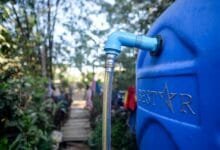
Myanmar Water Portal has shared 50 documents ranging from various topics related to water and environment throughout 2020. We hope all these documents would be helpful for the learners, researchers, and experts in their respective fields within the water sector. Among the various documents we have been shared, here are the top 5 most read documents in 2020.
1. National Waste Management Strategy and Action Plan for Myanmar (2017-2030)
The National Waste Management Strategy and Action Plan is the first national initiative aimed at institutionalising waste management and offers a visionary document and strategic guide to address key issues, needs and challenges whilst raising awareness amongst key stakeholders towards achieving a resource efficient and zero waste society. It respects the holistic nature of waste management, which needs to address waste in all its forms (solid waste, liquid waste/wastewater, and gaseous emissions)for pollution control and environmental management. However, considering the current priority, this strategy and action plan gives more focus to solid waste management at present.
It was developed by the Ministry of Natural Resources and Environmental Conservation (MONREC) with the assistance of the International Environmental Technology Centre (IETC) of the United Nations Environment Programme (UNEP) and the IGES Centre Collaborating with UNEP on Environmental Technologies (CCET). (Download PDF)
2. Climate Change Adaption in Myanmar (Facilitator Guide)
The overall aim of the training course is to build the capacity of national and local governments for integrating CCA and DRR measures into local development plans. The course modules are tailored to equip government officials with robust knowledge on climate change and its impacts in Myanmar, as well as with analytical and technical skills on how to develop local CCA and DRR strategies and plans based upon vulnerability assessments.
The course pursues the following specific objectives: to improve the knowledge on climate change including on approaches and frameworks for CCA; to understand characteristics and identify impacts of observed and projected climate changes in Myanmar and linkages with sustainable development of townships; to identify, assess and integrate suitable CCA measures into township development plans; to understand and address key cross-cutting issues in CCA, such as gender and DRR. (Download PDF)
3. Resettlement Plan – MYA: Yangon City Water Resilience Project
This is a draft resettlement plan which has been prepared for the Yangon City Water Resilience Project output-1 and especially for the water pipeline component. This draft RP is based on the feasibility studies and preliminary design. Based on the initial Inventory of Loss (IOL) survey undertaken in June 2019.
The project will address urgent urban resilience and water infrastructure needs associated with bulk water supply in Yangon. It will complement Yangon City’s efforts to expand reliable and safe water service coverage to 80% by 2040. The project outputs are
(i) Resilient bulk water transmission system strengthened and
(ii) Integrated urban water management capacity enhanced.
(Download PDF)
4. Impact of land-use for urbanization on Groundwater YANGON
U Myint Thein presents the impact of land use on the Groundwater in Yangon Region. He pointed out that management on groundwater should be properly taken out.according to the existing data and reports.He explains about:
- Population growth and land area development of Yangon;
- The ratio of groundwater recharge vs. discharge from ancient time to the present time;
- Yangon’s water supply system and role of groundwater supply in Yangon Region;
- Decreasing of groundwater recharge due to the increments of impervious surfaces, lack of green areas and land use growth;
- Effect of climate change on groundwater;
- Conclusion and control key points.
(Download PDF)
5. Timeline infographic shows how Sustainable Development Goals hinge on groundwater management | Water, Land and Ecosystems (Burmese)
An infographic entitled ‘GROUNDWATER – Critical for Sustainable Development’ illustrating a timeline of groundwater use throughout history and projected outcomes of continued groundwater abstraction was launched recently at the 2nd Southern African Development Community – Groundwater Management Institute (SADC-GMI) conference in Johannesburg, South Africa. The graphic shows some of the potential future impacts, highlighting residual potential groundwater development in regions of the world, like in parts of Africa, which can cushion against climate change and population growth, but also what could occur if we do not act now to manage this critical freshwater resource, especially in already heavily dependent regions.
This Burmese version is translated by six members from Myanmar Water Portal Translation Community. (Download PDF)










